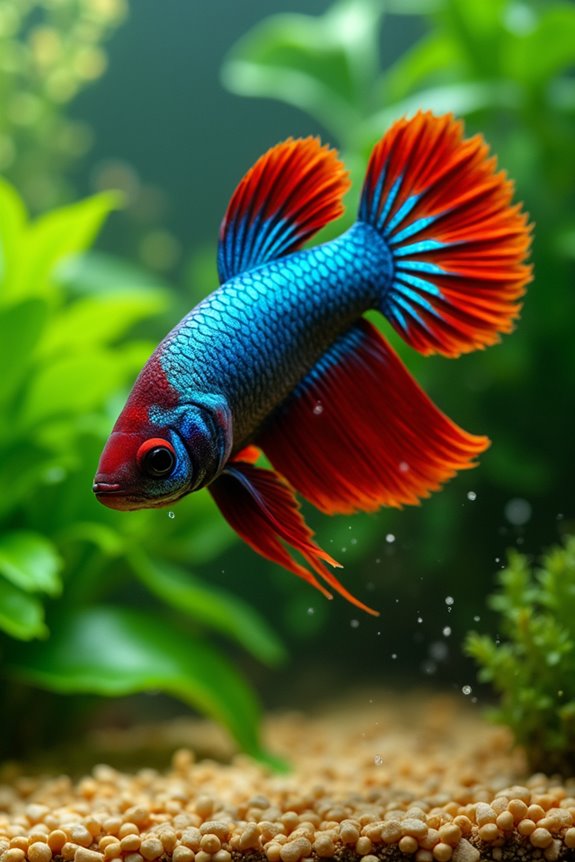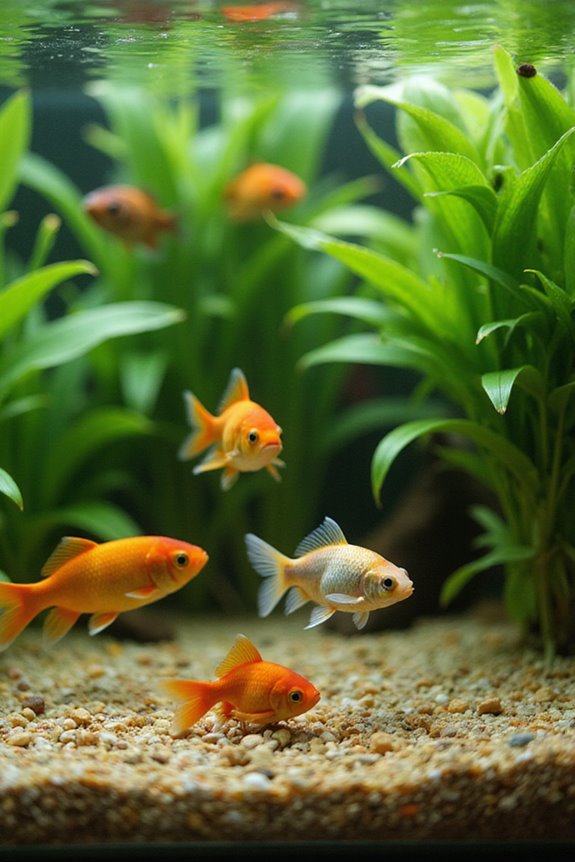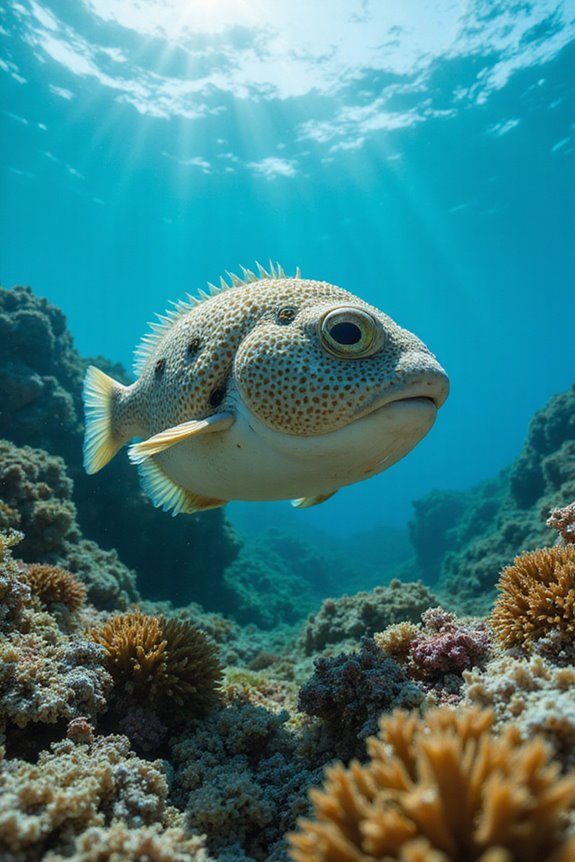I recommend feeding your betta fish once or twice a day. Space meals about 6-8 hours apart if you choose to feed twice daily. Use small amounts, starting with 3-4 pellets, as their stomach is roughly the size of their eye. Fasting your betta once a week helps with digestion and prevents constipation. Keep an eye on their behavior; a lack of appetite could signal stress. Understanding more about their care can enhance your fish-keeping experience.
Key Takeaways
- Feed betta fish once or twice daily, spacing meals 6-8 hours apart if feeding twice.
- Offer 3-4 small pellets daily, adjusting based on the betta’s behavior and appetite.
- Implement a weekly fasting period of 7-10 days to promote digestion and prevent constipation.
- Monitor water quality; uneaten food can decay and affect tank conditions, emphasizing the need for appropriate portion sizes.
- Observe your betta’s behavior; signs of lethargy or refusal to eat may indicate overfeeding or health issues.
Recommended Feeding Frequency
When considering how often to feed your betta fish, it’s important to keep in mind their specific dietary needs and habits. For ideal health, I recommend a feeding schedule of once or twice a day. If you choose to feed twice daily, space meals at least 6-8 hours apart to prevent digestive issues. You can also provide up to 4-5 small feedings a day if you’re using very small portions. It’s safer to start with smaller amounts and observe your betta’s behavior before gradually increasing. Regular fasting every 7-10 days is essential, as it promotes digestion and prevents constipation. Always monitor water temperature, as it can affect your fish’s metabolism and influence feeding schedules.
Meal Size and Type
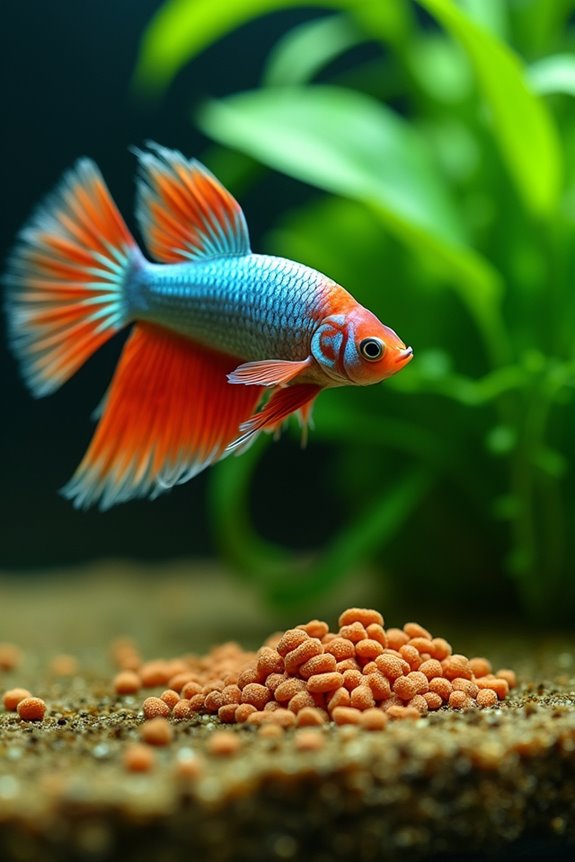
Feeding betta fish requires careful attention to both meal size and type to guarantee their health and vigor. I’ve found that adult bettas typically need about 1.8 grams of food daily, which provides a good benchmark. For pellet feeding, I start with 3-4 pellets per day and increase gradually, considering the betta’s behavior. It’s essential to remember that their stomach is roughly the size of their eye, so small portions are key. I also mix food variety, using pellets for consistency and supplementing with live or freeze-dried options in 2-3 pieces. This variety keeps my bettas engaged and healthy, ensuring they get the necessary nutrients without the risk of overfeeding or water contamination.
Importance of Fasting
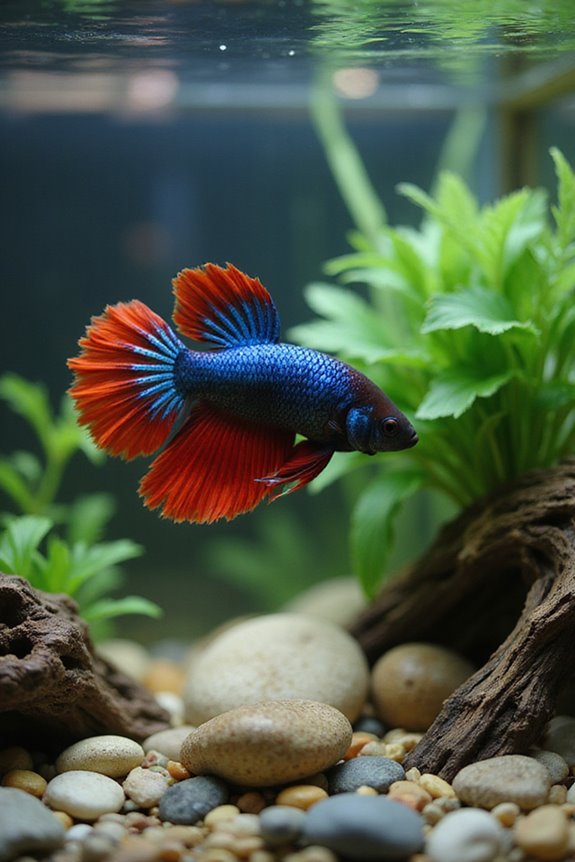
The importance of fasting for betta fish cannot be overstated, as it plays a significant role in their overall health and well-being. Fasting benefits these fish by promoting complete digestion and preventing constipation, which is essential for their digestive health. I recommend fasting your betta once a week, ideally on Sundays, to allow their digestive system some much-needed rest. This practice helps reduce the risk of gastrointestinal blockages and enhances nutrient absorption when they are fed again. Additionally, fasting minimizes food waste, leading to cleaner water conditions that support a healthier environment. By incorporating regular fasting into your feeding routine, you’ll contribute to your betta’s long-term health and wellness, ensuring they remain active and vibrant.
Environmental Considerations
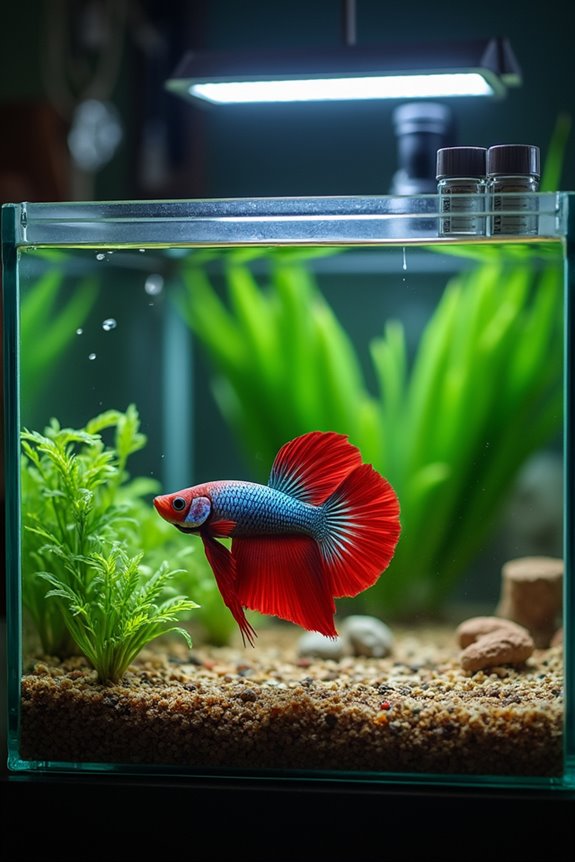
Environmental considerations play an essential role in determining how often betta fish need to be fed. The ideal tank temperature for bettas is between 78-80°F. If the temperature drops, their metabolism slows, requiring less food to prevent digestive issues. Maintaining good water quality is vital; overfeeding can lead to uneaten food decaying, which harms water parameters and stresses the fish. Seasonal changes also affect feeding; during shorter daylight, bettas may eat less. Finally, environmental enrichment, like adding plants or hiding spots, keeps bettas active, which can increase their feeding needs. By ensuring ideal tank conditions, I can support my betta’s health and feeding frequency effectively. Regular maintenance and monitoring are key to achieving this balance.
Behavioral and Health Indicators
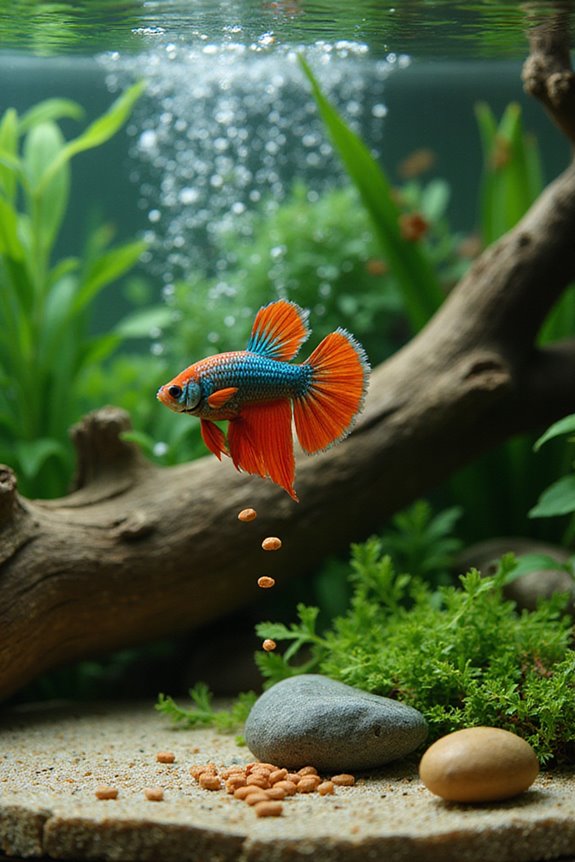
Understanding the behavioral and health indicators of betta fish is essential for ensuring their well-being. Observing feeding cues is vital; active bettas often display excitement around feeding time, while lethargic fish may indicate overfeeding or health issues. If your betta refuses food, it could signal stress or illness, so check tank conditions immediately. Monitor their body size; a rounded belly may suggest overfeeding, while sudden weight changes could indicate health problems. Remember, a consistent feeding schedule fosters stable behavior, reducing stress. Additionally, a fasting day each week helps maintain digestive health. By paying attention to these health signals, you can adjust feeding practices effectively, ensuring your betta thrives in its environment.
Feeding Best Practices
Feeding betta fish involves a careful balance of frequency, portion size, and diet to guarantee they remain healthy and active. I recommend feeding adult bettas once or twice daily, with two smaller meals often stimulating more activity. Use feeding techniques that involve spacing meals 6-8 hours apart. For portion adjustments, aim for 2-6 pellets per meal, ensuring they finish within two minutes to avoid waste. Incorporate a fasting day every 7-10 days to promote digestion and prevent constipation. Additionally, consider a varied diet with betta-specific pellets and occasional live or frozen foods like brine shrimp. Consistency in feeding times helps your betta recognize when to eat, reducing stress and ensuring they thrive in their environment.
Frequently Asked Questions
Can Bettas Eat Different Types of Fish Food?
I love offering my bettas different food varieties, like pellets and live protein sources. This not only keeps them interested but also guarantees they get a balanced diet for ideal health and vibrancy.
How Do I Know if My Betta Is Overfed?
I’ve noticed overfeeding signs like bloating and lethargy in my betta. It’s essential to monitor these symptoms for your betta’s health, ensuring they remain active and happy without the stress of excess food.
Should I Feed My Betta at the Same Time Daily?
Absolutely, I recommend establishing a consistent feeding schedule. It really helps with my betta’s behavior; he seems less stressed and more engaged. Plus, predictability supports his health, making it easier to monitor his appetite.
Can Bettas Fast for Longer Than a Week?
I’ve learned that bettas can fast for over a week, but it risks their health. For ideal betta fasting, I usually stick to short breaks to support their overall health and prevent stress.
What Happens if I Forget to Feed My Betta?
You know, I once forgot to feed my betta, and surprisingly, he handled it fine. But maintaining a consistent feeding schedule is essential for betta health, preventing stress and ensuring he thrives in his environment.

